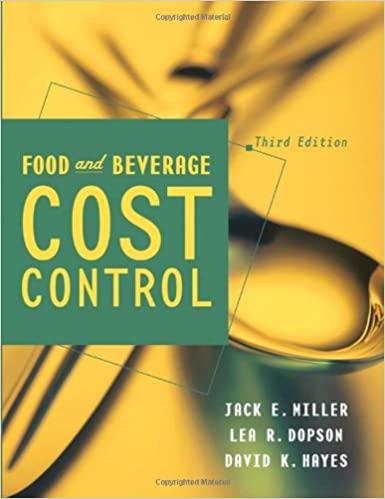



Way Cool produces two different models of air conditioners. The company produces the mechanical systems in its components department. The mechanical systems are combined with the housing assembly in its finishing department. The activities, costs, and drivers associated with these two manufacturing processes and the production support process follow. Process Activity Components Changeover Machining Setups Overhead Cost $ 474,000 310,000 234,000 $1,018,000 $ 184,000 225,000 Driver Number of batches Machine hours Number of setups Quantity 910 8,290 120 Finishing Welding Inspecting Rework Welding hours Number of inspections Rework orders 5,400 840 200 60,500 Support Purchasing Providing space Providing utilities $ 469,500 $ 133,000 30,500 64,000 $ 227,500 Purchase orders Number of units Number of units 561 4,760 4,760 Additional production information concerning its two product lines follows. Units produced Welding hours Batches Number of inspections Machine hours Setups Rework orders Purchase orders Model 145 1,700 1,800 455 500 2,950 60 150 374 Model 212 3,060 3,600 455 340 5,340 60 50 187 Required: 1. Determine departmental overhead rates and compute the overhead cost per unit for each product line. Base your overhead assignment for the components department on machine hours. Use welding hours to assign overhead costs to the finishing department. Assign costs to the support department based on number of purchase orders. 2. Determine the total cost per unit for each product line if the direct labor and direct materials costs per unit are $290 for Model 145 and $140 for Model 212. 3. If the market price for Model 145 is $1,700 and the market price for Model 212 is $250, determine the profit or loss per unit for each model. Complete this question by entering your answers in the tabs below. Required 1 Required 2 Required 3 Determine departmental overhead rates and compute the overhead cost per unit for each product line. Base your overhead assignment for the components department on machine hours. Use welding hours to assign overhead costs to the finishing department. Assign costs to the support department based on number of purchase orders. (Round your intermediate calculations and per unit cost answers to 2 decimal places.) Show less A Components department Finishing department Support department Model 145 Activity Driver Departmental OH Rate Total Overhead Cost Components Finishing Support Model 212 Activity Driver Departmental OH Rate Total Overhead Cost Components Finishing Support Process Activity Components Changeover Machining Setups Driver Number of batches Machine hours Number of setups Quantity 910 8,290 120 Finishing Welding Inspecting Rework Overhead Cost $ 474,000 310,000 234,000 $1,018,000 $ 184,000 225,000 60,500 $ 469,500 $ 133,000 30,500 64,000 227,500 Welding hours Number of inspections Rework orders 5,400 840 200 Support Purchasing Providing space Providing utilities Purchase orders Number of units Number of units 561 4,760 4,760 Additional production information concerning its two product lines follows. Units produced Welding hours Batches Number of inspections Machine hours Setups Rework orders Purchase orders Model 145 1,700 1,800 455 500 Model 212 3,060 3,600 455 340 5,340 60 50 187 2,950 60 150 374 Required: 1. Determine departmental overhead rates and compute the overhead cost per unit for each product line. Base your overhead assignment for the components department on machine hours. Use welding hours to assign overhead costs to the finishing department. Assign costs to the support department based on number of purchase orders. 2. Determine the total cost per unit for each product line if the direct labor and direct materials costs per unit are $290 for Model 145 and $140 for Model 212. 3. If the market price for Model 145 is $1,700 and the market price for Model 212 is $250, determine the profit or loss per unit for each model. Complete this question by entering your answers in the tabs below. Required 1 Required 2 Required 3 Determine the total cost per unit for each product line if the direct labor and direct materials costs per unit are $290 for Model 145 and $140 for Model 212. (Round your intermediate calculations and cost per unit answers to 2 decimal places.) Model 145 Model 212 Materials and Labor per unit Overhead cost per unit Total cost per unit Process Activity Components Changeover Machining Setups Driver Number of batches Machine hours Number of setups Quantity 910 8,290 120 Finishing Welding Inspecting Rework Overhead Cost $ 474,000 310,000 234,000 $1,018,000 $ 184,000 225,000 60,500 $ 469,500 $ 133,000 30,500 64,000 $ 227,500 Welding hours Number of inspections Rework orders 5,400 840 200 Support Purchasing Providing space Providing utilities Purchase orders Number of units Number of units 561 4,760 4,760 Additional production information concerning its two product lines follows. Units produced Welding hours Batches Number of inspections Machine hours Setups Rework orders Purchase orders Model 145 1,700 1,800 455 500 2,950 60 150 374 Model 212 3,060 3,600 455 340 5, 340 60 50 187 Required: 1. Determine departmental overhead rates and compute the overhead cost per unit for each product line. Base your overhead assignment for the components department on machine hours. Use welding hours to assign overhead costs to the finishing department. Assign costs to the support department based on number of purchase orders. 2. Determine the total cost per unit for each product line if the direct labor and direct materials costs per unit are $290 for Model 145 and $140 for Model 212. 3. If the market price for Model 145 is $1,700 and the market price for Model 212 is $250, determine the profit or loss per unit for each model. Complete this question by entering your answers in the tabs below. Required 1 Required 2 Required 3 If the market price for Model 145 is $1,700 and the market price for Model 212 is $250, determine the profit or loss per unit for each model. (Loss amounts should be indicated with a minus sign. Round your intermediate calculations and final answers to 2 decimal places.) Model 145 Model 212 Market price unit Cost per unit Profit (loss) per unit










